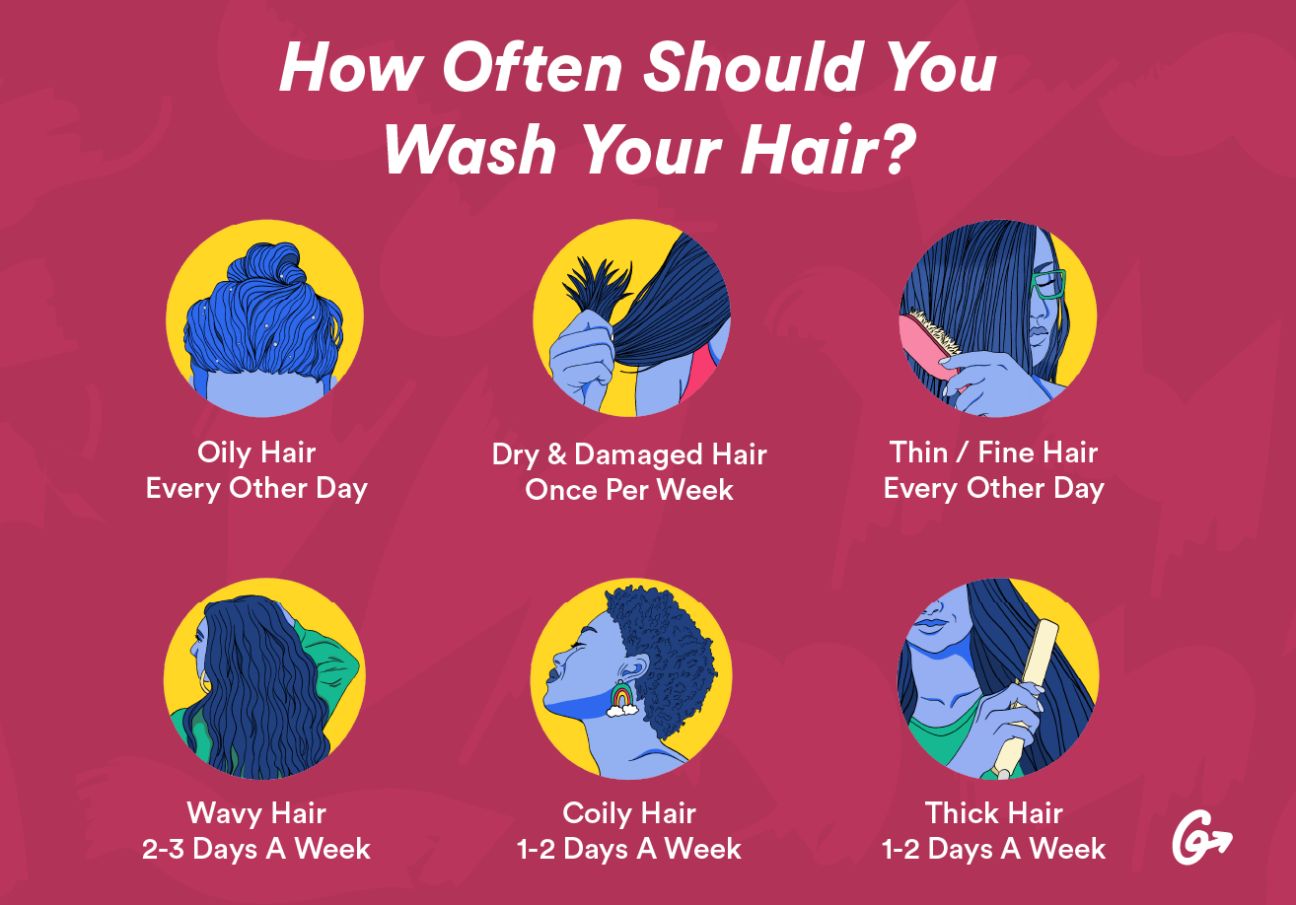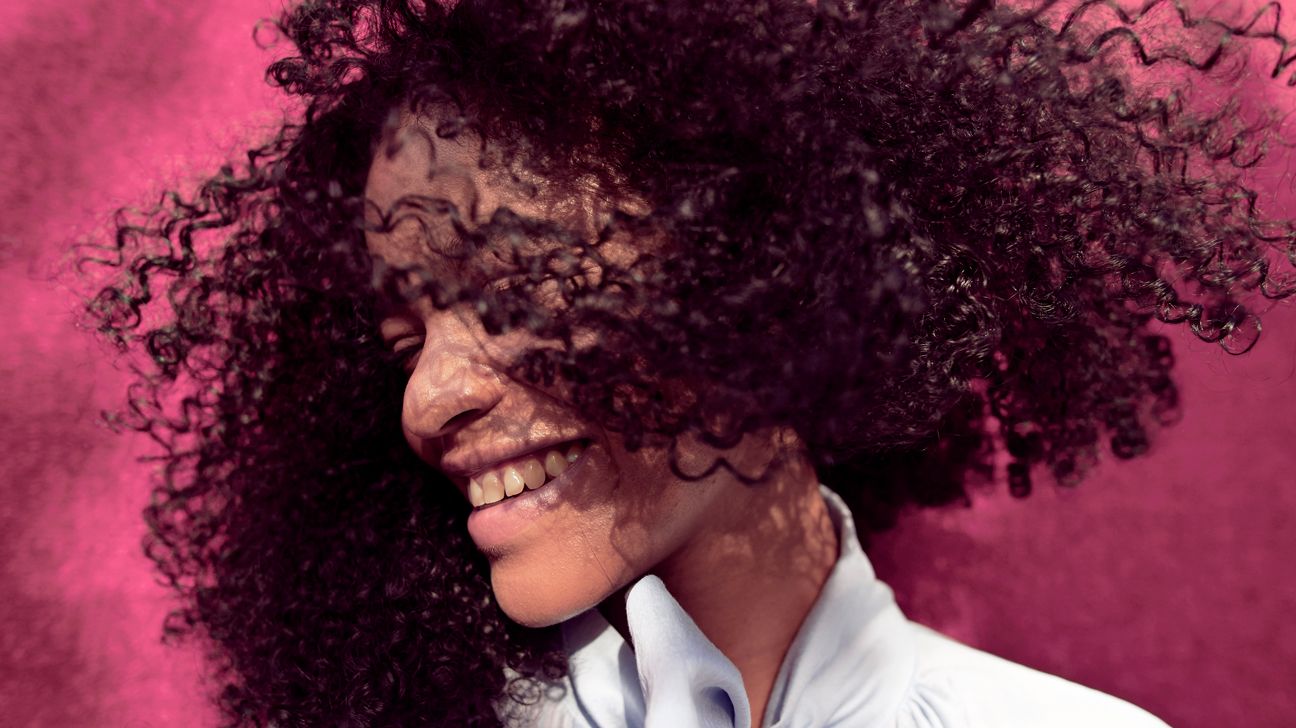Some folks need the jolt of a cold shower to wake up in the morning or a warm bath to relax at night. Others, like folks with dry skin, only shower every couple of days when they start to smell B.O. How frequently you rub-a-dub-dub is totally a matter of personal preference.
But bathing aside, how often should you wash your hair?
It depends on your hair type. Generally, folks who have fine or oily hair should wash their hair every other day. But those who have medium to thick, wavy, curly, coiled, or damaged hair can go a bit longer — usually 2 to 4 days.
FYI: Your hair might need more frequent TLC if you use products like hair dye, hairspray, styling gel, dry shampoo, or hair perfume.
There’s no one-size-fits-all approach to hair washing, and it’s def worth asking your hairstylist for help on your exact hair type. Here’s a handy-dandy guide to help you figure out how often to wash your locks:

Fine, flat hair. Fine, flat hair usually needs to be washed every other day. Fine hair tends to look greasy more easily (no fair!).
Medium thick hair. Medium thickness hair is not thin (duh) and not thick (also duh). Wash your medium thickness hair about 2 to 3 times a week.
Thick hair. Wash thick hair 1 to 2 times a week. (Thick hair can feel like it takes forever to dry, so we feel for you!)
Wavy hair. Wavy hair can typically be washed about 2 to 3 days a week.
Loose curly hair. Loose curls can look flat if they don’t get enough moisture. Wash those locks 2 to 3 times a week.
Coiled hair. Coiled hair comes in all different types. You’ll want to consult on your curl types and subclassifications. Wash your hair 1 to 2 times a week.
Damaged hair. Damaged hair usually refers to strands that’ve been color-treated and therefore, dry. You could wash as infrequently as once a week, so you don’t dry and damage your hair further.
Oily hair. Because your scalp is producing a lot of oil, you’ll prob need to wash your hair every other day. Pro tip: Try using a clarifying shampoo once a week to help with your oil.
Long hair? Short hair? Bald? It doesn’t matter — your body produces a waxy/oily substance called sebum from its sebaceous glands, which are also found on your scalp. This naturally oily substance spreads on your hair follicles to protect your locks.
Hair gets dirty, and even slightly smelly, just like the rest of our body. Shampoo contains cleansing agents — basically, detergents — that clean impurities off your hair.
Generally, these cleansing agents are called sulfates or surfactants. They cleanse everything from smoke to dead skin cells from your mane. But these detergents also strip your hair of its natural oils. So while shampooing does clean your hair, it can also make your hair and scalp dry AF.
Nope. Lots of people shower every day and shampoo their hair out of habit. But that doesn’t mean it’s good for hair health.
Shampooing too much dries out your hair and scalp. It’s stripping those oils off, remember? Your hair and scalp need those natural oils for that shine and bounce you crave.
Due to overly shampooing, some people find that their hair increasingly produces more oil over time. WTF? When your hair gets too dry, it’s constantly replenishing itself with that natural oil.
How often you have to wash your hair totally varies. Here are a few things to consider:
Oil
How much sebum is secreted from our sebaceous glands totally varies. If you have oily hair (which is actually an oily scalp) that looks greasy by the end of the day, sure, go ahead and shampoo more often.
Hair type
Your hair type matters, too. Fine, thin hair will need to be washed more often than curly, thick hair. Here’s how to figure out what hair type you have:
| 1 Straight | 2 Wavy | 3 Curly | 4 Coiled | |
| A | fine, thin, prone to oil | fine (has S shape) | fine or loose curls | tight, springy coils |
| B | medium (some volume) | medium (has S shape with some frizz) | medium or tight curls | Z coils |
| C | coarse, thick, won’t hold curls | coarse (has S shape, prone to frizz) | tight, thick curls | very tight, coarse coils |
Your sweatiness and activity level
Working out makes you sweat, even on your scalp — hence why your do looks a liiiittle greasy after a spin class. (Allow us to introduce you to your new BFF, dry shampoo.)
However, humans are not meant to live on dry shampoo alone. If you sweat often from working out (or just, you know, life), you’ll want to wash your hair and scalp more often.
Dirt, pollen, and pollution
Unless you work on a construction site or at a flower nursery, you probably don’t think about this. But dust, dirt, pollen, and sadly, air pollution all get on our hair and affect how dirty it gets. *searches air purifying plants*
Styling products
Hair spray, styling gel, dry shampoo, hair perfume… yup, these products build up and weigh down your locks. They can also irritate or damage your scalp. Not shampooing it out, just makes buildup worse.
Maybe you’ve been on a long flight or a camping trip and went a few extra days without washing your hair? That’s totally fine. You might feel gross, but it’s not going to irreparably damage your hair.
On the other hand, intentionally not washing your hair for weeks at a time and exclusively using dry shampoo could be a problem.
Generally, people should go about 3 days without washing hair. But the longer you go without washing your hair, the more oil, dust, dirt, and air pollution build up.
One more thing: Any type of hair can get knotted, tangled, or matted. Detangling spray, water, and conditioner can help loosen the strands up. But matted hair is really a combing problem, not a hygiene one. Ask your hairstylist for help if the knots or mats are really bad.
Yup, it’s possible to wash your hair too much. Here are the major signs you need to pump the brakes on your hair washing routine.
Dry, brittle hair
Limp, dry hair can sometimes feel like hay. It’s tough to style and breaks easily, leading to knots and tangles. To help dry hair you should also try to:
- Lay off the hairdryer for a bit (or use it on low).
- Get omega-3s from salmon or tuna for added shine.
- Vitamins like biotin, vitamin A, and iron make dry hair look alive.
Dry scalp or dandruff
Do you have an itchy scalp and small, white flakes in your hair? Congratulations, you may have a dry scalp.
If your itchy scalp is caused by red, scaly skin joined by larger white or yellow flakes, you probably have dandruff. Dandruff and dry scalp are actually two different issues — dandruff can be caused by oily hair or a fungus!
To combat dandruff and dry scalp, you can try:
- washing your hair with a moisturizing cleanser
- brushing your hair to stimulate the scalp
- giving your scalp a gentle massage
There are a couple of things you can do to keep your hair looking great between washes:
- Use the right hairbrush. Your hair follicles need some oil from your scalp for protection. Your best bet’s a natural bristle paddle brush made from boar bristles.
- But don’t overbrush! That “100 strokes before bed” thing is a myth.
- Keep your hair off your face so it doesn’t come in contact with makeup/sweat/sunscreen. If possible, pile your hair atop your head in a messy bun or ponytail.
- Wear a bonnet or silk scarf to sleep. Especially if you’re rocking coiled hair, a silk scarf or a bonnet help in the fight against friction and breakage.
- Sleep on clean pillowcases. Hair products and makeup do rub off at night. Do your laundry!
Cleansing your hair doesn’t have to mean lathering up with shampoo every time. The “no poo method,” which means forgoing shampoo, can mean using these tactics:
Co-washing
Co-washing means washing your hair with a cleansing conditioner that moisturizes the hair. Co-washing is an especially popular method for coiled hair.
Water only
If you want to make like the “Beatles” and let it be, simply wash your hair with water — and only water. This is the best option for folks who don’t have oily scalps. Use lukewarm water. Hot water can lead to a dry scalp and itchiness.
“No poo” products
Some hair care brands also offer special cleansers that are technically not shampoo products but can get your hair nice and clean.
- How often you should wash your hair depends on your hair type, hair texture, oiliness, and lifestyle.
- Shampoo contains cleansing agents to remove oil, dust, dirt, and air pollution.
- Shampooing can strip hair of its natural oils (called sebum).
- Oily hair needs to be washed more often.
- Dry hair, wavy hair, curly hair, and coiled hair need to be washed less frequently.
- Your hairstylist can help you, so you don’t waste hard-earned $$$ on products.
- Brush your hair every day to coat the strands in natural oils (and prevent knots!).
- Some people use a method called “no poo” and forgo shampoo when they wash their hair.


